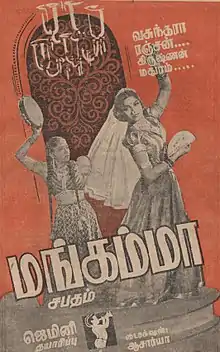Mangamma Sabatham (1943 film)
Mangamma Sabatham (transl. Mangamma's vow) is a 1943 Tamil language film,[1][2] starring Vasundhara Devi, Ranjan, N. S. Krishnan and T. A. Mathuram. The film was produced by S. S. Vasan and directed by T. G. Raghavanchari, credited in the film as Acharya.[3]
| Mangamma Sabatham | |
|---|---|
 | |
| Directed by | Acharya |
| Produced by | S. S. Vasan |
| Screenplay by | Acharya |
| Story by | Acharya |
| Starring | |
| Music by | S. Rajeswara Rao M. D. Parthasarathy |
| Cinematography | Ramnoth |
| Edited by | Chandru |
Production company | |
| Distributed by | Gemini Studios |
Release date |
|
| Country | India |
| Language | Tamil |
This is the first film that N. S. Krishnan and T. A. Mathuram featured for a Gemini film. NSK trained hard to do the tight-rope walking scene himself without using a double.[3] The film was remade in Hindi as Mangala in 1950, in Telugu as Mangala in 1951, and again as Mangamma Sapatham in Telugu in 1965.
Plot
A village girl is humiliated by a prince and vows to take revenge. She vows to make the prince marry her and have a child who would whip the prince in the court. However, her plans are almost foiled when the prince imprisons her when she tries to seduce him. The story revolves on how she tricks him into falling in love with her and begets a son through the prince who ultimately whips him in court.
Cast
- Vasundhara as Mangamma
- Ranjan as Sugunan, Jayapalan
- P. A. Subbaiah Pillai as Venkatachalam
- P. N. Seshagiri Bhagavathar as King
- P. V. Rao as Minister
- P. Appanna Iyengar as Adappakkaran
- Puliyoor Duraisami Iyer as Guard
- M. Ramamurthi as Sumathi
- A. S. Leelavathi as Rathi
- Kolathu Mani as Acrobat
- Ramasami as Sarangi
- N. S. Krishnan as Sathan
- T. A. Mathuram as Yamuna
Remakes
It was remade in Hindi[4] and Telegu[5] with the same plot with Ranjan and P. Bhanumathi (replacing Vasundhara Devi) in lead roles for both remakes. Table of Mangamma Sabatham and its other versions:
| Mangamma Sabatham (1943) (Tamil) | Mangala (1950) (Hindi) | Mangala (1951) (Telugu)[6] |
|---|---|---|
| Mangamma (Vasundhara) | Mangala (Bhanumathi) | Mangala (Bhanumathi) |
| Sugunan, Jayapalan (Ranjan) | Prince Shivpal, Jaypal (Ranjan) | Sugunapal, Jayapal (Ranjan) |
| Venkatachalam (P. A. Subbiah Pillai) | Mangala's Father (Badri Prasad) | Vekatachalam (Doraiswami) |
| King (P. N. Seshagiri Bhagavathar) | The King (T. E. Krishnamanchariar) | King (T. E. Krishnamacharya) |
| Minister (P. V. Rao) | The Minister (B. S. Kalla) | Minister (Srivatsava Venkateswara Rao) |
| Adappakkaran (P. Appanna Iyengar) | Valet to Shivpal (Narayan Rao) | Kasa (Narayan Rao) |
| Guard (Puliyoor Duraisami Iyer) | Balam (Agha) | Simgaram (T. R. Ramachandran) |
| Sumathi (M. Ramamurthi) | Shepherd Boy (Yogindranath) | Farmer Boy (Lakshmanan) |
| Rathi (A. S. Leelavathi) | Chameli (Suryaprabha) | Kunju (Suryaprabha) |
| Acrobat (Kolathu Mani) | Nat (David) | Acrobat (Kolathu Mani) |
| Sarangi (Ramasami) | Sadhu (Swaraj) | Sadhu (Vijaya Rao) |
| Sathan (N. S. Krishnan) | Guggu (Krishnamurthi) | Dippa (Krishnamoorthy) |
| Yamuna (T. A. Mathuram) | Bijli (Indira Acharya) | Rathi (Indira Acharya) |
| Balam's Mother (Surabhi Kamala) | Simgaram's Mother (Surabhi Kamala Bai) | |
| Young Jaypal (Pawan Sarin) | Young Jayapal (Pawan Sarin) | |
| Gemini Girls | Gemini Girls | Gemini Boys and Girls |
Reception
According to film historian Randor Guy, Mangamma Sabatham netted a profit of ₹4 million (US$56,000).[7]
Soundtrack
Music was composed by S. Rajeswara Rao and M. D. Parthasarathy while the lyrics were penned by Papanasam Sivan and Kothamangalam Subbu. Ranjan, Vasundara, N. S. Krishnan, T. A. Mathuram, and Ramasami were the singers.
| No | Song | Singer | Lyricist | Raga | Length(m:ss) |
|---|---|---|---|---|---|
| 1 | "Puththiyulla Manithar Enraal" | Vasundhara | Kothamangalam Subbu | Maand | 02:44 |
| 2 | "Anjaathae Nee Vaa" | Vasundhara | Kothamangalam Subbu | 01:41 | |
| 3 | "Vanna Puraavae Nee Yaar" | Ranjan | Kothamangalam Subbu | 01:51 | |
| 4 | "Aanantham Ithae" | Vasundhara | 01:53 | ||
| 5 | "Ayyaiyaiya Solla Vetkamaguthae" | Vasundara | |||
| 6 | "Jayame Jayame" | Vasundara Devi | Papanasam Sivan | Bilahari | 02:04 |
References
- Sundararaj Theodore Baskaran (1996). The eye of the serpent: an introduction to Tamil cinema. East West Books (Madras). p. 197. Retrieved 12 December 2012.
- Sruti. P.N. Sundaresan. 2006. p. 125. Retrieved 12 December 2012.
- Guy, Randor (23 November 2007). "Blast from the past — Mangamma Saatham". The Hindu. Archived from the original on 7 October 2017. Retrieved 7 October 2017.
- "Mangala (1951)". IMDb. Retrieved 26 August 2019.
- "Mangala (1951)". Telugu Cinema Prapamcham. Retrieved 26 August 2019.
- మంగళ (song book) (in Telugu). Gemini Studios. 1950.
- Randor Guy (December 2008). "... And thus he made Chandralekha sixty years ago". Madras Musings. XVIII. Archived from the original on 24 May 2013. Retrieved 2 July 2013.